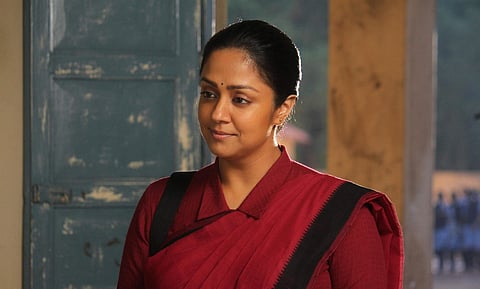Raatchasi Movie Review: This well-intentioned Jyotika film is tedious and preachy
Rating:(2 / 5)
Remember that last scene in Baasha when a defeated Mark Antony sees Manickam striding towards him, and can’t help but see flashes of Baasha, as he once knew him? As Jyotika, playing the role of Geetharani in Raatchasi, delivers supposedly rousing monologues and walks towards the camera, I found myself seeing flashes of Samuthirakani. The latter, after all, has made these pamphlet films his own. They are well-intentioned, but are usually found wanting in cinematic finesse. That Geetharani is a headmistress (headmaster as some loadedly call her), lends to unquestionable authority and more uncontested lectures. She’s come to head a government school in a village called R. Puthur, and it’s gone rogue.
It was hard not to be reminded of Aarusaamy as she walks into the school, pretending to be a commoner. She takes in the little details—the school boys smoking cigarettes, the teachers engrossed with their mobile phones, the dilapidated structure of the school (which of course is a metaphor for the health of government schools)—before she gets her mass introduction scene. I liked that the music that heralds her arrival isn’t composer Sean Roldan going berserk, but simply that of a school bell being rung. The bells have rung, and the mythical arrival of the saviour is complete.
Director: Gowthamraj
Cast: Jyotika, Poornima, Hareesh Peradi
After that efficient beginning, Raatchasi settles into a dull, comfortable zone where familiar demons get addressed, and not particularly in enterprising ways. It’s a film led by its omnipresent dialogue; it’s how Geetharani provides solutions. Someone talks about how private schools are sought-after even if they are expensive, and Geetharani responds with a biting punchline. She meets a dissenting student who wants out, and she steps up with a scathing question. A violent group wants her out, and she, again, solves it with a monologue. There’s a lot of talking, as, I suppose, is the hallmark of such preachy films.
Once her Saamy introduction is out of the way, she steps into the Mudhalvan zone. She steps into a system that is resistant to change; she has urgent reforms to implement, and mainly her authority to do it with. There’s a ‘one-day HM’ idea. There’s a ‘Sunday school’ idea. There’s a ‘three questions’ idea. And like Arjun suddenly unleashes fighting ability, so does she, but here, she’s armed with a hasty back story. Jyotika plays Geetharani with a perpetual smirk, and would you blame her, given her character is surrounded by incompetence. There’s an English teacher who can’t talk the language, a math teacher who doesn’t understand its applications, and a PET teacher (Sathyan) who’s constantly taking a nibble from his secret stash of snacks. I quite enjoyed Sathyan in this film (when a fellow teacher questions his constant eating, he says, “Vaai exercise panren”), even if he exists — like Manivannan in Mudhalvan — to take Geetha’s side whenever required or to clarify the obvious to the audience. Curiously, it’s never established that he cares about reforming himself.
There are other decent subplots, but like the Sathyan angle, they seem to exist to serve some formulaic purpose. The father-daughter angle, the senior teacher-Geetharani relationship, and why, even the ‘romantic’ track and how it’s interpreted in this story, are all decent ideas, but never truly get integrated into an organic whole. Take the whole auto driver-Geetha exchange, for instance. It seems to exist almost in a different film. It’s a common problem with such pamphlet films.
These are less feature films and more video messages that hope to create positive social change. Given the lack of cinematic finesse though, you have to wonder how impactful they really are. Given their reluctance to truly sink into the dirt, these films seem more like escapist fantasies that make the comfortable suggestion that utopia is within our grasp if only we did A, B, and C. These issues, and the real world, of course, is far more complicated, and such simplistic messaging, no matter how well-intentioned, doesn’t help, except to serve as a fleeting pat on the shoulder, I suppose. Geetharani, we are told, is a trained fighter, and yet, the fight sequences are never convincing. They seem far too easy, with the bad guys looking like they are not even trying hard. It’s a succinct summary of the film itself. Walking out of Raatchasi, you would think that some one-liners and common advice are all it takes to change the world.
There are bits I liked in the film though. I enjoyed that director Gowthamraj resists opportunities to mass-ify the film more. The villain, for instance, is reasonably humanised. There are some nifty touches too, like that final dialogue by the auto driver. I also liked that something as small and seemingly insignificant as a phone call is all it takes to rectify a big problem for Geetharani. But these are only small crests in a film that is, for the most part, devoid of them. Again, the film is well-intentioned, but really, it’s time for us to begin saying loudly that alone isn’t enough.

